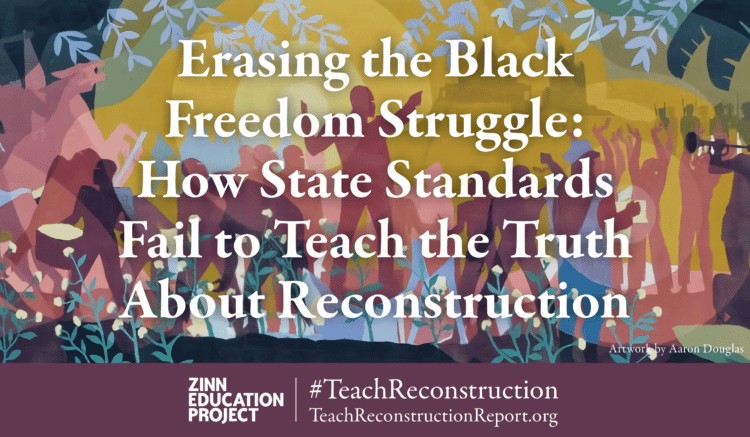Signatures
This is the list of people who have signed the pledge or petition to date.
Julia Nations | Cedar Park, TX
Maurice Shelton JP
We don’t know how exactly the American experiment has failed without exploring this period of time.
Janette Kirchner | East Petersburg, PA
Because and equitable and representative education is important. It's important to know how and why Reconstruction failed and that its failure led to things like Jim Crow laws.
Reina Robinson | Castro Valley, CA
Amy Hoke | West Chicago, IL
Margaret Alvarado | Tempe, AZ
Eric Forste | Minneapolis, MN
Many of the gains made then were reversed and lost. Too many young people don’t know we ever made those gains in the first place.
Pablo Willis | Bethesda, MD
Jill Boyd Myers | Pinehurst, NC
Anonymous | Latham, NY
Ben Rall | Spokane, WA
barbara rose | Watertown, MA
The large scale voting and political successes of Black Americans during Reconstruction and the political deal that ended it are an important part of American history. The Lost Cause mythology needs to be taught as well as it tried to rewrite history--and did so.
Angela Watson | Philadelphia, PA
Lisa Anderson | Astoria, NY
Wendy Shih | Portland, OR
Phyllis Snyder | West Palm Beach, FL
Tim Yager | Nashville, TN
Josarie Molina | Washington, DC
Valencia Gorman | Kansas City, MO
We started this school year off with a month-long optional session during which we taught and learned about systemic racism. We started with the roots of racism and how it was used by several nations, including America, as a way to legitimize slavery. We learned what systemic racism is and how it's been embedded in America's laws, economy, culture, media, politics, housing...etc. from the inception of this country. We discussed the idea of "one step forward, two steps back" as a way of examining how little some things changed even in the wake of huge change, like making slavery illegal and enacting Civil Rights. For black students, this answers the question of "Why is so hard for so many black people to get by now, generations after slavery?" I was always told I could do anything, yet I always found that hard to believe, looking at the standing of so many other black people in America. It was helpful for me to look at the condition and situation of black people in this country from day one and truthfully examine our strengths and weaknesses, the obstacles set before us and our accomplishments despite those obstacles. It was also helpful to unpack certain 'truths' for all students - e.g. pull yourself up by the bootstraps, all men are created equal, slavery was a long time ago - the damage is done, the impact is gone. It was enlightening to present the information and allow students to draw their own, informed conclusions. We also made a point of teaching about the resourcefulness and resilience of black people - two very American traits that we don't generally associate with poor people or people of color, but these are traits these very people exhibit.
Kendra Caduff | Northfield, MN
I echo the importance of our students to learn the very aspects that shape our current political and social existence. We study history as a way to learn and understand the present. Without this critical piece of our national story, we don't have a realistic view of who we are and how we got here. We can't learn from a past that is not studied in its true narrative and with all voices sharing. As an educator, a Christian, and a white settler/descendant, the story of my family's history is not separate from that of others and needs to discussed in the context of the experiences of others from that same time period. Let's start doing better as we can no longer say we don't know better.
Isabel Antreasian | Baltimore, MD
Caleb Schoenfeld | El Monte, CA
Tess Posso | La Crescenta, CA
It is our history so we must not ignore it.
Praise Hall | Silver Spring, MD
Ben Rall | Spokane, WA







Twitter
Google plus
LinkedIn